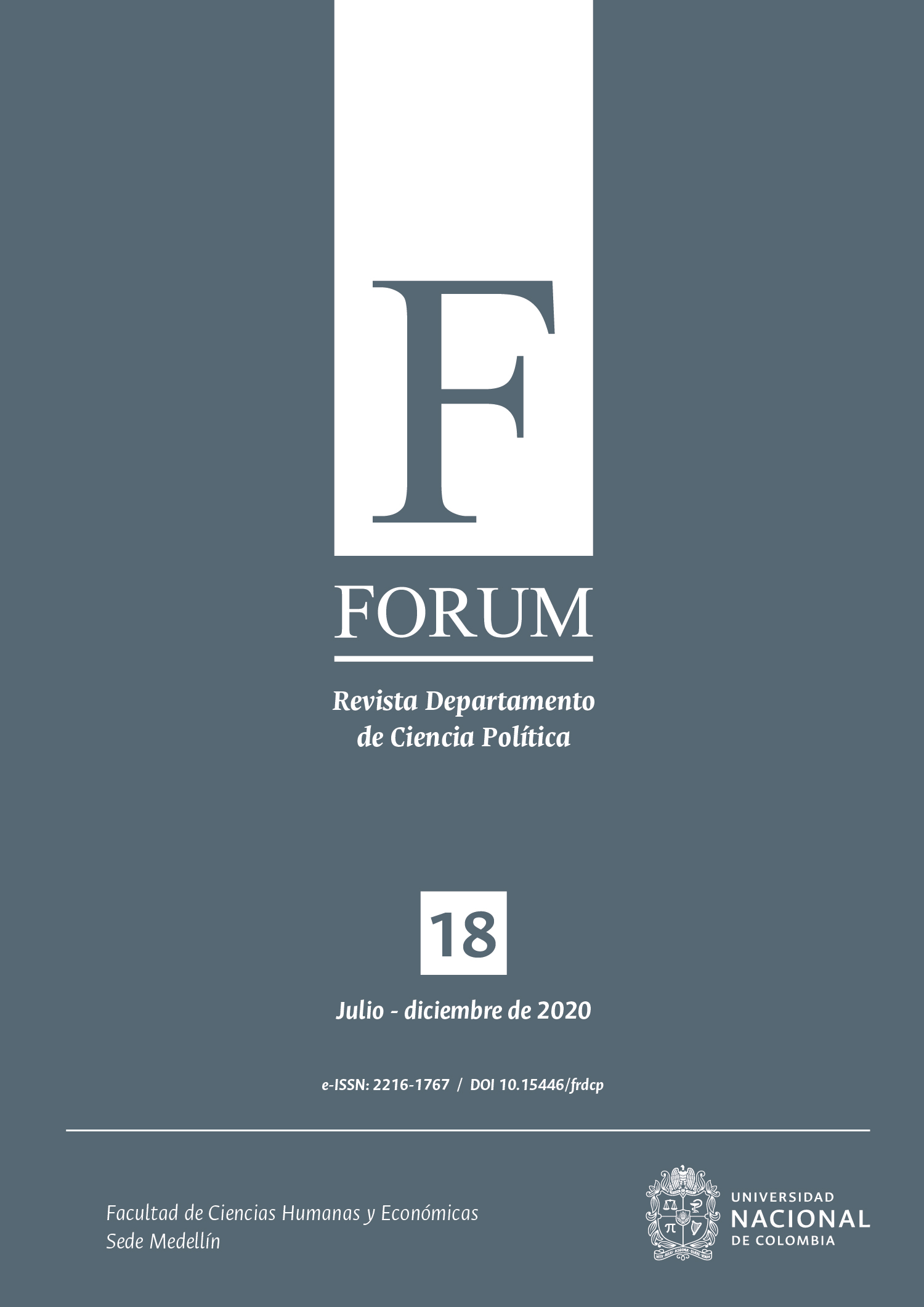Una entrevista con Tanya Golash-Boza
An Interview with Tanya Golash-Boza
DOI:
https://doi.org/10.15446/frdcp.n18.89113Palabras clave:
Migration, Mexico, USA, criminalization (en)migración, México, Estados Unidos, Fronteras, Criminalización (es)
Manuela Boatcă and Lirio Gutiérrez-Rivera (MB & LGR): You have done extensive research and published on migration, how did you become interested in the subject?
Tanya Golash-Boza (TGB): I began my career as a Latin Americanist. This led to me teaching classes on U.S. interventions in Latin America, which in turn led to me developing an understanding of how these interventions, have led to U.S. migration flows.
I was teaching a course on the role of the United States in the world in the spring of 2006 when immigrants in the United States led some of the largest marches seen in this country. When millions of immigrants and their allies organized the Gran Marcha to protest the criminalization of immigrants, my students began asking more questions not only about what brought immigrants to the United States, but also what happens to them once they get here. I decided I needed to learn more and thus began the research for my first book on immigration policy: Immigration Nation.
(MB & LGR): Migration is not new; various studies, yours included, observe a change in the immigration policies in the U.S. (and Western Europe) around the 1990s characterized by more restriction and control of persons coming principally from Latin America, Asia, and Africa (Juliet Strumpf talks about crimmigration, which refers to the use of criminal law to regulate and control immigrants). Why did governments introduce changes in immigration policies towards particular groups/populations during this period?
(TGB): As long as the United States has had immigration policies, these policies have been racist. The Chinese Exclusion Act was designed to limit flows of Chinese immigrants. The Immigration Act of 1924 set quotas on migrants from countries considered undesirable. These laws were overturned in 1965 with the Hart-Celler Act.
These changes in U.S. immigration law led to large numbers of Asian and Latin American immigrants arriving in the United States. Beginning in the 1980s, there was a resurgence of racist nativism in the United States, which led to the passage of the 1986 Immigration Reform and Control Act.
The changes in the 1990s were a continuation of these nativist policies, combined with renewed interest in the enhancement of the coercive arm of the state through carceral politics. Beginning in the 1980s, politicians in the United States realized they could use racialized and gendered fears of crime as an effective campaign strategy. Thus, politicians from the left and the right tried to show how they were tougher on crime than the others. These discursive battles led to policies that ended in mass incarceration. The 1996 bills signed into law by President Bill Clinton happened in this context: They were immigration bills that focused on punishing lawbreakers.
(MB & LGR): We have witnessed immigration policy under the Trump administration become even harsher for particular groups of migrants, such as Muslims and migrants from Mexico and Central America. What do you see as the main differences in the immigration policies under Trump and the previous administrations (e.g. Obama, Bush and even Clinton)?
(TGB): I see more similarities than differences across these administrations. For many politicians, immigrants are not a valued constituency whereas nativists are.
President Bill Clinton signed the Illegal Immigration Reform and Immigrant Responsibility Act of 1996 and the Antiterrorism and Effective Death Penalty Act of 1996 into law. These laws rendered millions of people deportable and led to increases in deportations.
Deportations began to slow down in the first year of the millennium and President George W. Bush engaged in negotiations that could have led to policy changes that were favorable towards immigrants. However, these negotiations stalled permanently once 9/11 happened.
In the aftermath of the terrorist attacks of September 11, 2001, President George W. Bush created the Department of Homeland Security. This led to a massive infusion of funds into immigration law enforcement and a consequent increase in the number of deportations. The more money put into deportations; the more people deported.
When President Barack Obama stepped into office, he inherited a well-oiled deportation machine that he kept running for his first term. This led to unprecedented numbers of deportations. During Obama’s second term, he granted some relief to undocumented migrants and redirected some resources within the Department of Homeland Security that reduced the number of deportations.
Donald Trump campaigned on an overtly anti-immigrant platform and came to office with hateful rhetoric and policies. As President, Trump issued a series of anti-immigrant Executive Orders, many of which have been successfully been challenged in court. Trump’s polices have led to an increasing sense of fear in immigrant communities, even though his administration is deporting far fewer people than that of Barack Obama and most of his Executive Orders have gone unrealized.
Trump’s rhetoric and policies have galvanized racists and nativists and we are seeing a resurgence of right-wing nationalism in the United States today. This is the most significant change that affects the daily lives of migrants and their family members.
(MB & LGR): Migration and border control have often been tied to policies of race and ethnicity in different national contexts. To what extent can we speak of race and ethnic profiling in migration and border policies in the U.S. today?
(TGB): A 1975 Supreme Court decision, United States v. Brignoni-Ponce ruled that Border Patrol officers couldn’t stop vehicles solely because the occupant appears to be of Mexican descent. However, they can use Mexican appearance as one of at least two criteria for stopping vehicles. Racial profiling is thus legal on the U.S./Mexico border.
Within the United States, police officers cannot use race or ethnicity as a criterion for choosing to stop and question a person. Nevertheless, many studies have found that police do racially profile. Racial profiling by police officers leads to large numbers of arrests of Black and Latinx people. In the United States, police arrests are often the first step in the pathway to deportation for non-citizens. Thus, racial profiling by police officers leads to great disparities in deportations.
For example, in Deported, I explain that Jamaican and Dominican legal permanent residents are far more likely to be deported than legal residents from countries where most residents are White or Asian. About 80 percent of Dominicans and 40 percent of Jamaicans are deported after being convicted of drug charges. Thus, the racial disparities in the enforcement of drug laws in the United States have translated into racial disparities in deportations.
(MB & LGR): As you analyzed in your book Deported, these immigration policies led to massive deportations, which has impacted greatly the lives of persons who have immigrated to the US for various reasons. These harsh immigration policies are not compatible with the labor demand in the US provided largely by these migrants and have not stopped people from Latin America and Africa from migrating to the US. What type of immigration policy do you think would both fit the current context and lessen, instead of exacerbating inequalities?
(TGB): Every day, thousands of residents of the Global South make the difficult decision to leave their countries of birth in search of a better life. There are many other reasons for migration: war, insecurity, violence, and family reunification. Nevertheless, we would see far less international migration were it not for global inequality. Thus, any serious immigration policy would have to grapple with the reality of global capitalism and global inequality.
We could of course infuse immigration policies with due process or create policies that respect the human rights of migrants. One could easily create policies that are far more humane than the policies currently on the books. Nevertheless, insofar as these policies do not consider the broader context of global inequality, they will be severely limited.
(MB & LGR): Often, these harsh immigration policies and racism and xenophobia towards migrants are attributed only to the US and Western Europe, yet they have increasingly been implemented in other regions. For instance, Mexico’s attempt to stop immigration of Central Americans heading to the US, or the massive migration of Venezuelans to the neighboring countries (Colombia, Brazil, Ecuador) or other countries in Latin America leading governments to change their immigration policies towards Venezuelans (for instance, demanding an entry visa, or limiting their stay in the country). Do you see a connection with what has been happening in the US (and Western Europe)?
(TGB): Yes. Racism is prevalent in the U.S., Europe, and Latin America and is at the core of these restrictive immigration policies.
(MB & LGR): Racialized and ethnicized migration policies taking hold globally, from Latin America to Eastern Europe or India, have been traced back to the rise to power of right-wing movements and nationalist parties, as we currently see in India’s new naturalization law and or the Hungarian government’s border wall and anti-Muslim rhetoric. Do you see a correlation between the two phenomena and/or historical parallels with previous eras?
(TGB): Racism, Nativism, Islamophobia, and anti-Semitism have been prevalent throughout the twentieth century and now into the 21st century. I do see a connection between Hungary’s border walls, anti-Muslim rhetoric in India, right-wing nationalism in Scandinavia, and the Muslim ban in the United States. Divide and conquer is an effective strategy. This strategy is used by powerful elites to distract us from the fact that they are hoarding the vast majority of the world’s resources. Each of these cases has their own nuances. However, the underlying processes share far more similarities than differences.
Thanks for accepting to do an interview for the Dossier on migrations that will be published in Forum.
Notes
Cómo citar
APA
ACM
ACS
ABNT
Chicago
Harvard
IEEE
MLA
Turabian
Vancouver
Descargar cita
Licencia
Derechos de autor 2020 Forum. Revista Departamento de Ciencia Política

Esta obra está bajo una licencia internacional Creative Commons Atribución-NoComercial-SinDerivadas 4.0.
Aquellos autores/as que tengan publicaciones con FORUM Revista Departamento de Ciencia Política, aceptan los términos siguientes:- Los autores/as conservarán sus derechos de autor y garantizarán a la revista el derecho de primera publicación de su obra, el cuál estará simultáneamente sujeto a la Licencia de reconocimiento de Creative Commons Atribución – No comercial – Sin Derivar 4.0 que permite a terceros compartir la obra siempre que se indique su autor y su primera publicación esta revista.
- Los autores/as podrán adoptar otros acuerdos de licencia no exclusiva de distribución de la versión de la obra publicada (p. ej.: depositarla en un archivo telemático institucional o publicarla en un volumen monográfico) siempre que se indique la publicación inicial en esta revista.
- Se permite y recomienda a los autores/as difundir su obra a través de Internet (p. ej.: en archivos telemáticos institucionales o en su página web) antes y durante el proceso de envío, lo cual puede producir intercambios interesantes y aumentar las citas de la obra publicada. (Véase El efecto del acceso abierto).
































